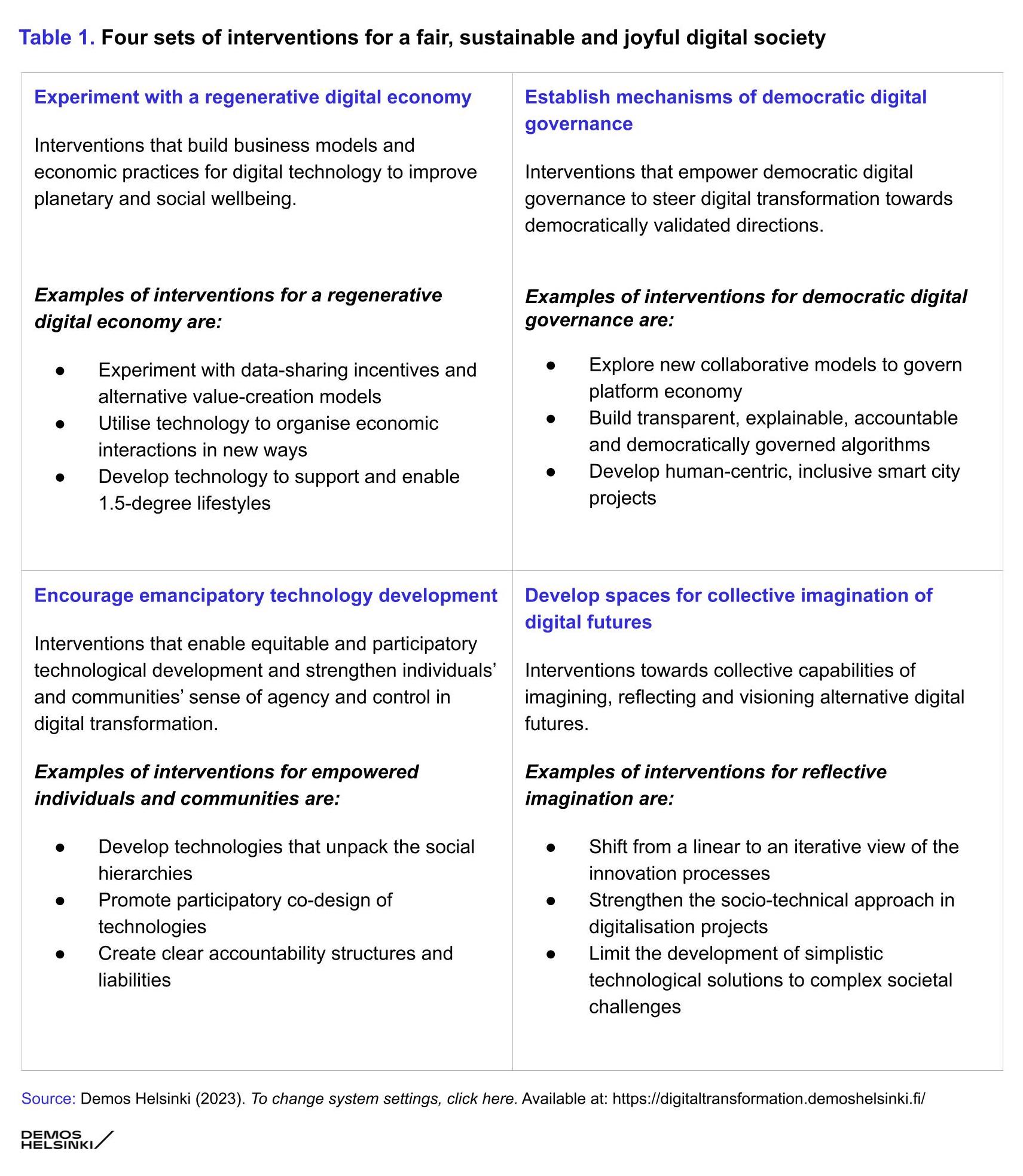Published 15 February 2023
In this white paper, Demos Helsinki explores how we can rewrite the terms and conditions of our digital futures. Directed at policymakers, practitioners, researchers, industry leaders, and engaged citizens, the paper concludes with four sets of interventions that build a fair, sustainable, and joyful digital society.
Why do we need to intervene and change the system settings of digitalisation?
On the one hand, we are more connected than ever. Despite differences in the reach of the internet, digital technologies and the web have weaved people together and offered innovative tools, products and services to more of us. Undersea cables, wires and mined minerals have created digitally networked worlds that offer many of us leisure, ease and new opportunities for business and the provision of services.
On the other hand, what many see as efficient services and the blossoming of creativity in their lives, is shadowed by news of data misuse, abuse of power, precarious work and extractive mining of natural resources. The immaterial world of the digital is actually constructed on a material reality of minerals, copper, cables and labour.
There are six blind spots of digital transformation that we collate in this paper, which urge us to intervene: the material side of digital, challenges of digital labour, the dull side of smart cities, extractive business models, hostile digital states, and “algorithmic hierarchies”. These blind spots describe the hidden foundations or consequences of the established approach to digitalisation.
Do we accept these terms and conditions? If we don’t, we need to change the settings: we do this through interventions.
What interventions could build a fair, sustainable, and joyful digital society?
Society can achieve this vision if we coordinate and push for change at the top while concurrently creating new models and spaces to challenge the current technological progress paradigm at the bottom.
In the paper, we put forward four sets of interventions, each coming with its own specific actions. These can be addressed by governments and regulators, policymakers, companies, developers, researchers, and organisations.
For each set of interventions, we also collect case studies that are already pursuing these, so we know that they are realistic and practical.

What happens if we don’t intervene?
At the time of writing, tech giants and social media platforms are putting forward their own political philosophies. They have a vision for what world they want to create, and they pursue it with their resources, whether it is the Metaverse or the colonisation of Mars. At times, they do so at the expense of their financial viability, showcasing unforeseen determination and commitment to their societal vision. This is the context in which we are calling for societal stakeholders to develop their own ambitious visions and pursue them with their own resources.
What can you do now?
Besides making a warm beverage and taking your time to digest this paper, we hope that you note next steps for you and your organisation. At the very least, we hope you find that (1) we need to change course and (2) there is hope. The many case examples in the paper validate both. See what you can do, from wherever you are to build a fair, sustainable and joyful digital society:
>> READ THE PAPER <<
See relevant projects from Demos Helsinki:
- Building new models for the data economy
- Exploring the fair adoption of DLTs in the public sector
- An assessment framework for non-discriminatory AI systems
We’re here to support policymakers, companies, cities, developers, and researchers in many ways. For example:
- How can you, as a policymaker, incentivise meaningful technological solutions to societal challenges? Read more about our work on mission-oriented innovation policy.
- How can you, as a technology company, lead this transition with purpose? Read more about skopegy, a tool that helps you embed purpose in your strategy, while maintaining financial viability.
- How can you, as a city representative, create a vision for your city beyond just “smart”? Read more about a people-first city, which can drive meaningful innovation.
- How can you, as a technology developer, contribute to the creation of joyful digital solutions? Read more about the Assessment framework for non-discriminatory AI systems.
- How can you, as a researcher, change the settings of digitalisation? Get inspired by exciting projects in the space: Building new models for the data economy and Exploring the fair adoption of DLTs in the public sector.
Contact us if you want to scope other opportunities for impact.
>> CONTACT US <<
Read Demos Helsinki’s previous work on building fair, sustainable and joyful digital societies:
Feature Image: Jon White